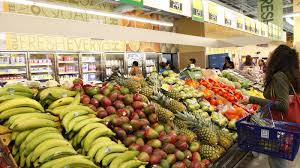In spite of its huge potential in production of perishable products, Nigeria currently lack conditioning centres as the cold chain in exporting the products.
The country is noted for its global leadership position in the production of yam and cassava tubers, shea nuts cocoayam, Sorghum melon seed, kola nut and other agricultural produce, but it is not listed in the world Export market.
Dr. Obiora Madu, Managing Director of Muiltimix, said in Ibadan that Nigeria was not recognized as an exporting country of any particular product.
Madu presented a paper at a one day Inter-Agency stakeholders’ workshop on Non-Oil shipping trade capacity in the South West.
As at 2016, Nigeria occupied the first position in the production of yam, with 38 million metric tons, cassava with 54 million metric tons, Sorghum with 6.9 million metric tons, Cocoayam with 3.4 metric tons Melon with 514,000 metric tons, Shea nut 330,000 metric tons and Kola nut with 138,000, metric tons
He said that the credibility problem of Nigeria has also affected exports from the country as most exporters now take their products to Ghana for onward export to other countries of the world.
Madu, an Adjunct Professor, also said that most of the yams and other agricultural products purportedly exported by Ghana are actually from Nigeria.
CBN injects $337.16 million, 56.17m CNY into retail Secondary Market Intervention Sales
He however refused the mention the name of any Nigerian exporter that passes through Ghana to export their cargoes stating, “Even if I know, I will not tell you”.
He also disclosed that even when government came up with an unfriendly foreign exchange policy, most Nigerian exporters opened domiciliary accounts in some of these neighbouring countries.
Madu stated: “Because of the national credibility that we have, people will not believe that we can do things right, so for that reason people are moving their goods to Ghana including yams, shea nut and shea butter.
“When they came up with the obnoxious foreign exchange policy, Nigerian exporters opened domiciliary accounts in Ghana, Togo and Benin Republic.
“They illegally move the goods out, they sell, pick up their foreign exchange from there, cross the border and come and sell at the black market.
“You see, there is need for a comprehensive, a holistic approach to grow the export industry.
“The African Growth and Opportunity Act, AGOA is almost thirty years old 6,500 items that can go the United States duty free, quota free, and we have not been able to take that opportunity.
“Virtually all African countries are benefitting from AGOA.
Like I said at the workshop, Nigerian cocoa seed is better than that of Ghana and Cote D’ Voire.
FG must ban NPK fertiliser import to save N720bn – FEPSAN
“Ghana is producing 800,000 metric tons, Cote D’Voire is doing 1.4million metric tons per annum but Nigeria is doing like 300,000 metric tons.
Meanwhile, a Nigerian assisted Cote D’Voire to grow their Cocoa industry .
“Africa is producing cocoa but the chocolate producers are dictating the prices
Adding value to the cocoa beans will make the farmer richer.”
Madu further disclosed that Nigeria currently produces about 60% percent of the world shea nuts .
He suggested that the agriculture policies needs to revisited and reviewed adding that scrapping the Produce Boards spelt doom for the agricultural industry.
“From available statistics, only few countries of the world can match Nigeria’s endowment in the area of natural resources with an estimated population of over 180 million people, an onshore and offshore that boast of some of the finest deposits of oil and natural gas, a rainforest belt that offers the best cash crops and hard wood and a savannah region with very large tones of oil seeds, coffee, chilies, spices and abundant solid mineral resources.
“In fact, the opportunities, which Nigeria offers investors in the field of non-oil, export are immense and irresistible.’’
Read more: AllAfrica
Nigeria lacks capacity to export perishable goods
RELATED ARTICLES




